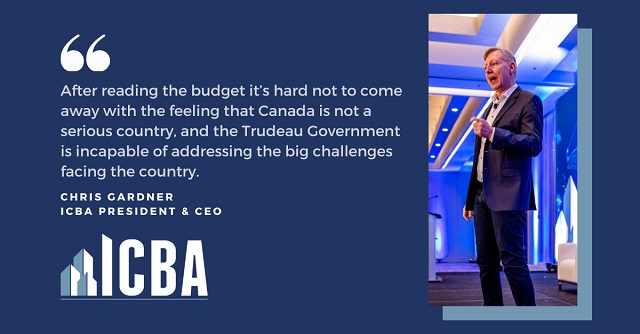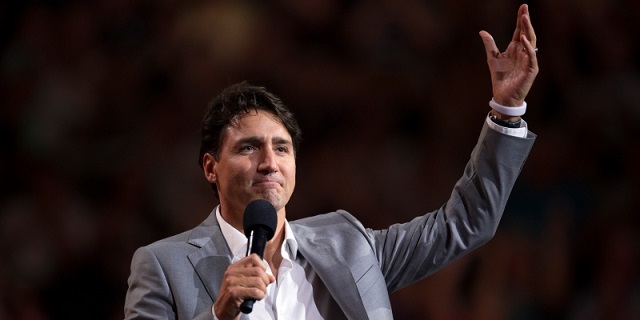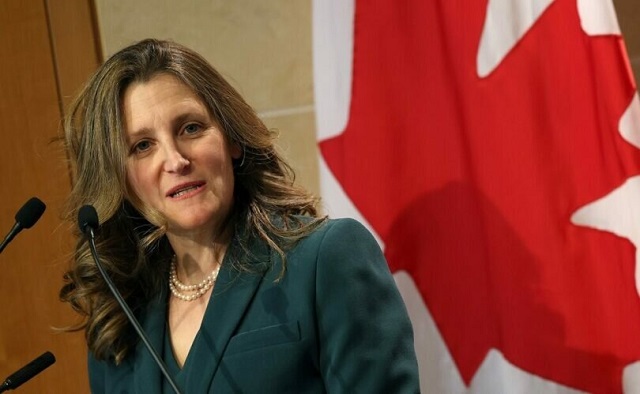Business
Doubling Down on Missing the Mark

By Chris Gardner
President, Independent Contractors and Businesses Association
Earlier this year, public opinion research company Leger published the results of a nationwide poll. One result stood out: 70 per cent of Canadians agreed with the statement: “It feels like everything is broken in this country right now.”
To young people, families and business owners struggling to buy or stay in a home, find a doctor, pay for gas and groceries, hire people, worried about how unsafe our streets have become, or having to navigate a never-ending web of red tape to get projects approved, a deep sense of helplessness has set in.
Over the past few years, Canada’s long slow decline has become the subject of an avalanche of scrutiny and by every measure of social well-being and economic competitiveness, Canada is coming up short among its global peers. Canada’s ability to generate opportunities and long-term prosperity for its people is now at serious risk.
But anyone reading the 9th budget of the Trudeau Government looking for some relief from the big challenges that Canadian families and entrepreneurs are facing, will come away sorely disappointed.
It seems that every day there is a new report telling Canadians what they already know – buying or staying in a home has never been harder in this country. Just last week, RBC reported that it is the ‘toughest time ever’ to afford a home and that the share of household income needed to cover ownership costs is now 64% in Canada and an almost inconceivable 106% in Vancouver and 85% in Toronto.
CMHC estimates that we need to build 800,000 homes a year between now and 2030 to meet demand, while CIBC says it’s closer to 1 million. Keep in mind that in 2023 we built about 230,000 new homes.
With the shortage of people across every part of our economy now acute, a central question asked by many is ‘who will build all these homes?’. Our labour markets are undergoing a seismic shift – absent immigration, our population is flat-lining and will start to decline. Indeed, in B.C., in 2022, for the first time ever, natural births exceeded natural deaths – and it happened again last year.
Part of the answer is immigration. However, our immigration system is failing us. Last year we added a city the size of Calgary to our national population, and we are on track to do the same in 2024. Two major challenges have emerged. First, we have failed miserably to assess the skills gaps in our economy – doctors, nurses, technicians, teachers and trades workers – and attract them to Canada. Case in point: only 2% of all permanent immigrants in 2023 will pursue a career in the construction trades. Second, the torrid pace of our population growth is crushing affordability and overwhelming the infrastructure in our major centres. In 2021 there was a total of 1.3MN non-permanent residents in Canada; today we have 2.6MN. We must find a better balance – attract the people with the right skills to power our economy and in numbers that our schools, hospitals, transit systems and housing stock can reasonably absorb.
Canada has a remarkable competitive advantage in its natural resources – energy and minerals in abundance and in high demand. And, harnessing them provides some of the highest paying jobs in the country. Budget 2024 offered barely a passing reference to this enormous potential for Canada. No one should be surprised. Leaders from Germany, Japan and Greece have visited Canada and received the diplomatic equivalent of a cold shoulder at the suggestion that Canada supply their economies with much needed energy. One federal minister stated that Ottawa is ‘not interested in funding LNG projects.’ He missed the point completely – no one was asking Ottawa to fund anything; they simply want Ottawa to get out of the way.
Finally, last year, the CD Howe Institute reported that for every dollar that an American business spends on training, technology and capital – the essential ingredients for innovation – a Canadian company invests 58 cents. Business investment in Canada from 2015 to 2023 ranked 44 out of the 47 most advanced economies, according to the OECD. This matters because the more innovative Canadian firms, the more they spend on upskilling their people and on adopting new technology, the more they can increase the size of paycheques for workers. Canada’s lagging productivity is to the point where the Deputy Governor of the Bank of Canada said, “You know those signs that say, ‘In an emergency, break the glass?’ Well, it’s time to break the glass.”
After reading the budget it’s hard not to come away with the feeling that Canada is not a serious country, and the Trudeau Government is incapable of addressing the big challenges facing the country.
Why do so many people feel like everything in this country is broken? Because so much is breaking all around us.
Chris Gardner is the President and CEO of the Independent Contractors and Businesses Association.
The Independent Contractors and Businesses Association (ICBA), the largest construction association in Canada, represents more than 4,000 members and clients. ICBA is one of the leading independent providers of group health and retirement benefits in Canada, supporting nearly 170,000 Canadians, and the single largest sponsor of trades apprentices in B.C. ICBA is Merit Canada’s affiliate in B.C. and Alberta. www.icba.ca
Business
Taxpayers criticize Trudeau and Ford for Honda deal

From the Canadian Taxpayers Federation
Author: Jay Goldberg
The Canadian Taxpayers Federation is criticizing the Trudeau and Ford governments to for giving $5 billion to the Honda Motor Company.
“The Trudeau and Ford governments are giving billions to yet another multinational corporation and leaving middle-class Canadians to pay for it,” said Jay Goldberg, CTF Ontario Director. “Prime Minister Justin Trudeau is sending small businesses bigger a bill with his capital gains tax hike and now he’s handing out billions more in corporate welfare to a huge multinational.
“This announcement is fundamentally unfair to taxpayers.”
The Trudeau government is giving Honda $2.5 billion. The Ford government announced an additional $2.5 billion subsidies for Honda.
The federal and provincial governments claim this new deal will create 1,000 new jobs, according to media reports. Even if that’s true, the handout will cost taxpayers $5 million per job. And according to Globe and Mail investigation, the government doesn’t even have a proper process in place to track whether promised jobs are actually created.
The Parliamentary Budget Officer has also called into question the government’s claims when it made similar multi-billion-dollar handouts to other multinational corporations.
“The break-even timeline for the $28.2 billion in production subsidies announced for Stellantis-LGES and Volkswagen is estimated to be 20 years, significantly longer than the government’s estimate of a payback within five years for Volkswagen,” wrote the Parliamentary Budget Officer said.
“If politicians want to grow the economy, they should cut taxes and red tape and cancel the corporate welfare,” said Franco Terrazzano, CTF Federal Director. “Just days ago, Trudeau said he wants the rich to pay more, so he should make rich multinational corporations pay for their own factories.”
Business
UN plastics plans are unscientific and unrealistic

News release from the Coalition of Concerned Manufacturers and Businesses of Canada
“We must focus on practical solutions and upgrading our recycling infrastructure, not ridiculous restrictions that will harm our health care system, sanitary food supply, increase costs and endanger Canadians’ safety, among other downsides.”
This week Ottawa welcomes 4,000 delegates from the United Nations to discuss how they will oversee a reduction and even possible elimination of plastics from our lives. The key problem is no one has ever figured out how they will replace this essential component of our modern economy and society. The Coalition of Concerned Manufacturers and Businesses of Canada (CCMBC) has launched an information campaign to discuss the realities of plastic, how it contributes massively to our society and the foolishness of those who think plastics can be eliminated or greatly reduced without creating serious problems for key industries such as health care, sanitary food provision, many essential consumer products and safety/protective equipment, among others. CCMBC President Catherine Swift said “The key goal should be to keep plastics in the economy and out of the environment, not eliminate many valuable and irreplaceable plastic items. The plastics and petrochemical industries represent about 300,000 jobs and tens of billions contribution to GDP in Canada, and are on a growth trend.”
The UN campaign to ban plastics to date has been thwarted by reality and facts. UN efforts to eliminate plastics began in 2017, motivated by such terrible images as rivers with massive amounts of floating plastic and animals suffering from negative effects of plastic materials. Although these images were dramatic and disturbing, they do not represent the big picture of what is really happening and do not take into account the many ways plastics are hugely positive elements of modern society. Swift added “Furthermore, Canada is not one of the problem countries with respect to plastics waste. Developing countries are the main culprits and any solution must involve helping the leading plastics polluters find workable solutions and better recycling technology and practices.”
The main goal of plastic is to preserve and protect. Can you imagine health care without sanitary, flexible, irreplaceable and recyclable plastic products? How would we keep our food fresh, clean and healthy without plastic wraps and packaging? Plastic replaces many heavier and less durable materials in so many consumer products too numerous to count. Plastics help the environment by reducing food waste, replacing heavier materials in automobiles and other products that make them more energy-efficient. Many plastics are infinitely recyclable and innovations are taking place to improve them constantly. What is also less known is that most of the replacements for plastics are more expensive and actually worse for the environment.
Swift stated “Environment Minister Steven Guilbeault has been convinced by the superficial arguments that plastics are always bad despite the facts. He has pursued a campaign against all plastics as a result, without factoring in the reality of the immense value of plastic products and that nothing can replace their many attributes. Fortunately, the Canadian Federal court overturned his absurd ban on a number of plastic products on the basis that it was unscientific, impractical and impinged upon provincial jurisdiction.” Sadly, Guilbeault and his Liberal cohorts plan to appeal this legal decision despite its common-sense conclusions. Opinion polls of Canadians show that a strong majority would prefer this government abandon its plastics crusade at this point, but history shows these Liberals prefer pursuing their unrealistic and costly ideologies instead of policies that Canadians support.
The bottom line is that plastics are an essential part of our modern society and opposition has been based on erroneous premises and ill-informed environmentalist claims. Swift concluded “Canada’s record on plastics is one of the best in the world. This doesn’t mean the status quo is sufficient, but we must focus on practical solutions and upgrading our recycling infrastructure, not ridiculous restrictions that will harm our health care system, sanitary food supply, increase costs and endanger Canadians’ safety, among other downsides.” The current Liberal government approach is one that has no basis in fact or science and emphasizes virtue-signaling over tangible and measurable results. Swift noted “The UN’s original founding purpose after World War II was to prevent another world war. Given our fractious international climate, they should stick to their original goal instead of promoting social justice warrior causes that are unhelpful and expensive.”
The CCMBC was formed in 2016 with a mandate to advocate for proactive and innovative policies that are conducive to manufacturing and business retention and safeguarding job growth in Canada.
SOURCE Coalition of Concerned Manufacturers and Businesses of Canada
-

 Business2 days ago
Business2 days agoDon’t be fooled by high-speed rail
-

 Alberta2 days ago
Alberta2 days agoActivity-Based Hospital Funding in Alberta: Insights from Quebec and Australia
-

 Business2 days ago
Business2 days agoUN plastics plans are unscientific and unrealistic
-

 Business2 days ago
Business2 days agoTaxpayers criticize Trudeau and Ford for Honda deal
-

 Fraser Institute2 days ago
Fraser Institute2 days agoCanadians should decide what to do with their money—not politicians and bureaucrats
-

 Addictions2 days ago
Addictions2 days agoBritish Columbia should allow addicts to possess even more drugs, federal report suggests
-

 Alberta1 day ago
Alberta1 day agoPolitical parties will be part of municipal elections in Edmonton and Calgary pilot projects
-

 Bruce Dowbiggin1 day ago
Bruce Dowbiggin1 day agoCome For The Graduate Studies, Stay For The Revolution







